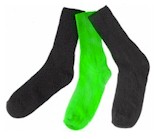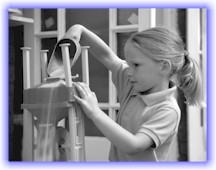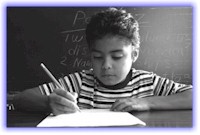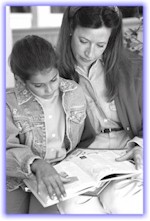Parents can teach best by asking open-ended questions and taking time to encourage answers.
Observing: Invite young eyes and fingers to notice small details.
- “What shapes do you see in that spider web?”
- “Does the crust on this bread feel different from the crust on that one?”
 Classifying: Put things in groups based on their characteristics.
Classifying: Put things in groups based on their characteristics.
- “Let’s sort the socks by color.”
- “Can you think of a way to divide your toys according to a pattern?”
Predicting: Put ideas about how the world works into words and test them.
- “How long will an ice cube last sitting on the counter?”
- “Will it last longer on another surface?”
Quantifying: Encourage children to quantify the world around them.
- “Who is the shortest person in the family? By how much?”
- “How many steps big is your room? The living room?”
The skills of science can and should be practiced everywhere. But it’s clear from research that children’s minds grow best when the environment is rich and varied. Use open-ended dialogue with your children as you explore the neighborhood, the grocery store, the park, or the local fire station. Field trips need not be long, expensive, or elaborate to help young minds turn to science.
Science is all around us!
 What you say to your child is important. But what may be even more important is what you don’t say.
What you say to your child is important. But what may be even more important is what you don’t say.
Parents often convey their attitudes and expectations in indirect ways. If you tell your children, “I never liked science in school” or “I got my worst grades in science,” you convey the expectation that science classes will be boring or difficult, or worse, that you would accept low performance in science. On the other hand, if you say, “I wish I could do that experiment with you” or “I’m so glad that you are having opportunities that I missed,” you will open doors for your children.
Not every child, of course, is destined to seek a career in science. But every child should be able to become a scientifically literate adult, and all children should know that if they choose science as a career, they can succeed. Parental expectations can encourage positive attitudes and personal best.
Don’t forget, too, that girls are every bit as curious as boys are about science. Buy your daughter that tool kit. And remember that science is often “messy.” Recognize the difference between clutter that comes from enthusiastic activity and the sloppy piles that result from neglect.
Other Helpful Tips
- Encourage your child to take things apart! Old toys, clocks, and household appliances are great lessons—and don’t worry about putting them back together!
- Don’t forget about safety. Supervise young children as needed.
- Discuss science and technology careers. When you encounter people in science-related careers, encourage your children to ask questions about these jobs and the training needed for them.
- Explore informal education sites. Science centers, museums, and natural science institutions give children the chance to make independent discoveries and participate in scientific processes while having fun.
- Check out science-related library books and read them together. NSTA publishes a list of outstanding children's science trade books for kindergarten through 12th grade students selected by a book review panel appointed by NSTA and assembled in cooperation with the Children's Book Council (CBC).
- Encourage children to explore awards programs and competitions that bolster science learning in the classroom.
 Classrooms are microcosms of the world. But even the best classrooms can’t provide a complete environment for learning science. That’s why parents must be partners in nurturing science learning in their children’s schools.
Classrooms are microcosms of the world. But even the best classrooms can’t provide a complete environment for learning science. That’s why parents must be partners in nurturing science learning in their children’s schools.
- Talk about school science with your child. Find ways to discuss and extend school science lessons in the home and other familiar places. If you don’t know any examples, ask your child’s teacher. Most textbook series have manuals that list activities to support the textbook lessons. You can also find science activities on the internet and in library books and magazines.
- Participate in school committees to develop and evaluate your school’s curriculum and instruction. Insist that there be adequate time and support for school science.
- Become an activist in your community. Help schools spread the message that a scientifically literate population contributes to the economic base of a community and of our nation. This is why quality science education is worth the cost.
- Help coordinate a field trip to a science-related institution, or bring in guest speakers to your child’s classroom who can share how science is involved in their jobs.
 Myth #1: Science teaching is better left to the science teacher.
Myth #1: Science teaching is better left to the science teacher.
A parent is a child's first and most important teacher. Whether you know it or not, your child has been learning from you since the moment he or she was born. Many parents, however, would rather leave science teaching to the teacher. Parents play a very important role and have the ability to significantly increase a child's interest and performance in science. With a little creativity, you can work science into your child's everyday life and find many opportunities for you and your child to explore and learn together.
Myth #2: Science is difficult.
It would be difficult to know all the facts of science. But science isn’t just facts. It’s a way of seeing the world around us and solving problems. Doing science is for everyone! That’s why “being scientific” is a great family activity.
Myth #3: I'm not a scientist and don’t know enough about science to help my kids.
You do not have to be a scientist to help your children learn science. The majority of parents in this country are not scientists, but it doesn't mean they can’t help their children learn science. Questions like Why is the sky blue? Why does ice float? Or how does a Frisbee soar through the air? are just a few examples of science questions you can explore with your children. The most important starting point is to ask: “Why?”
Myth #4: I have to know the answers to all of my child's questions.
It's okay to say, “I don't know.” As a parent, you're probably familiar with the questions “Why?” and “How come?” Children by nature are very inquisitive and interested in the world around them. We wouldn't be telling the truth if we said we could answer all of their questions. But herein lies the opportunity for them to explore, alone or with you, and have fun discovering the answers.
Myth #5: Science is all about facts and not very interesting.
SCIENCE IS FUN! Science teaching today is a lot different than it was years ago. Today's emphasis is on inquiry, which means children are encouraged to explore their own natural curiosities about the world around them. Science museums and centers are sprouting up around the country because they allow children to conduct independent investigations on their own … and children have a lot of fun!
Myth #6: Science requires equipment.
Science is everywhere! The skills of science can be practiced in any environment, including the kitchen or the park. The best way to begin is through conversation. Parents who ask open-ended questions (ones that don’t have just one “right” answer) and who listen patiently to their children’s responses are modeling the most essential skills for young scientists.
Myth #7: Science skills should wait for reading skills.
To encourage the “whole child,” parents and teachers should join together to foster early science experiences along with opportunities for reading. In many ways, preschoolers’ developmental skills are more suited to doing science than reading. Learning about science also can motivate kids to read.
 Resources from the National Science Teaching Association
Resources from the National Science Teaching Association
Other Resources
Is your child’s teacher a member of the National Science Teachers Association?
NSTA represents more than 53,000 science educators nationwide—it’s the world’s largest organization committed to science teaching and learning for all. We hope your child’s teacher is a member of our team. If not, please encourage him or her to visit our website—www.nsta.org—and join the most active and innovative colleagues in the profession.
 Classifying: Put things in groups based on their characteristics.
Classifying: Put things in groups based on their characteristics.


 What you say to your child is important. But what may be even more important is what you don’t say.
What you say to your child is important. But what may be even more important is what you don’t say. Classrooms are microcosms of the world. But even the best classrooms can’t provide a complete environment for learning science. That’s why parents must be partners in nurturing science learning in their children’s schools.
Classrooms are microcosms of the world. But even the best classrooms can’t provide a complete environment for learning science. That’s why parents must be partners in nurturing science learning in their children’s schools. Myth #1: Science teaching is better left to the science teacher.
Myth #1: Science teaching is better left to the science teacher. Resources from the
Resources from the